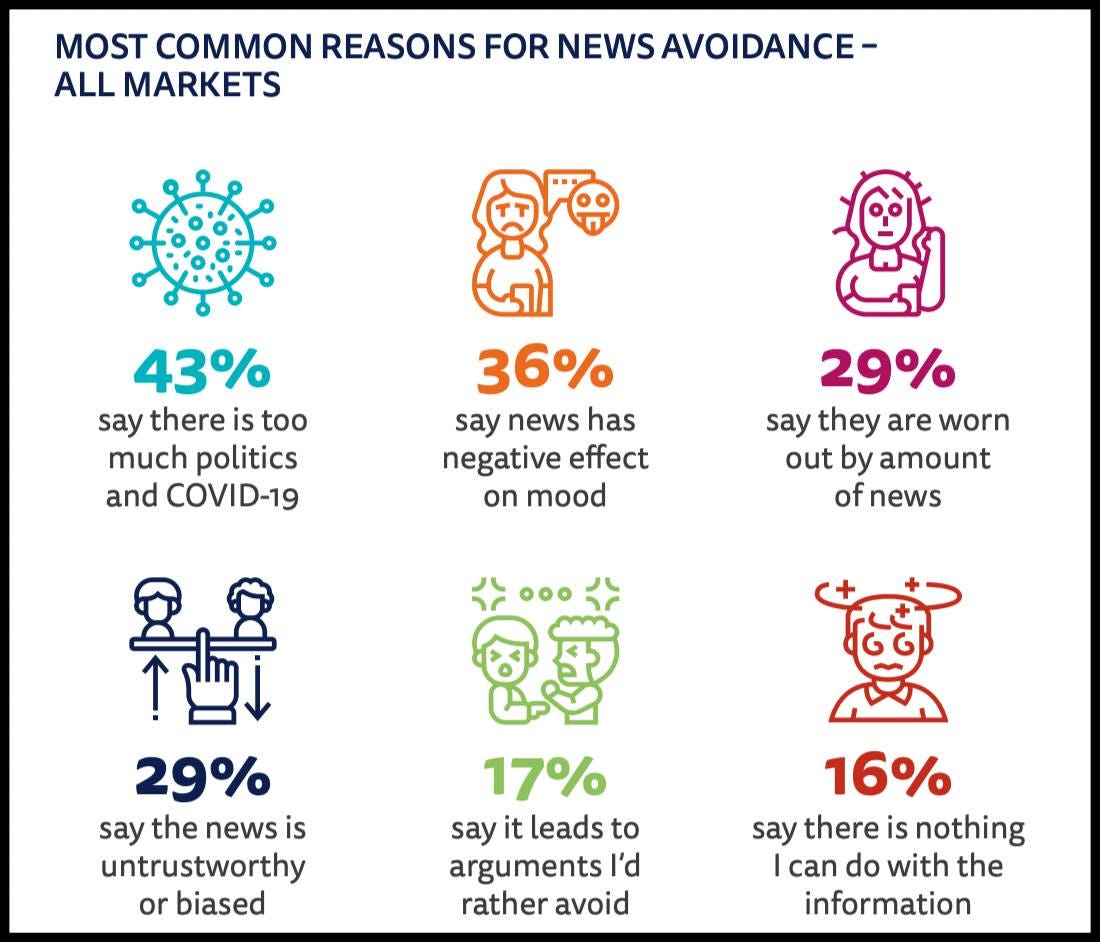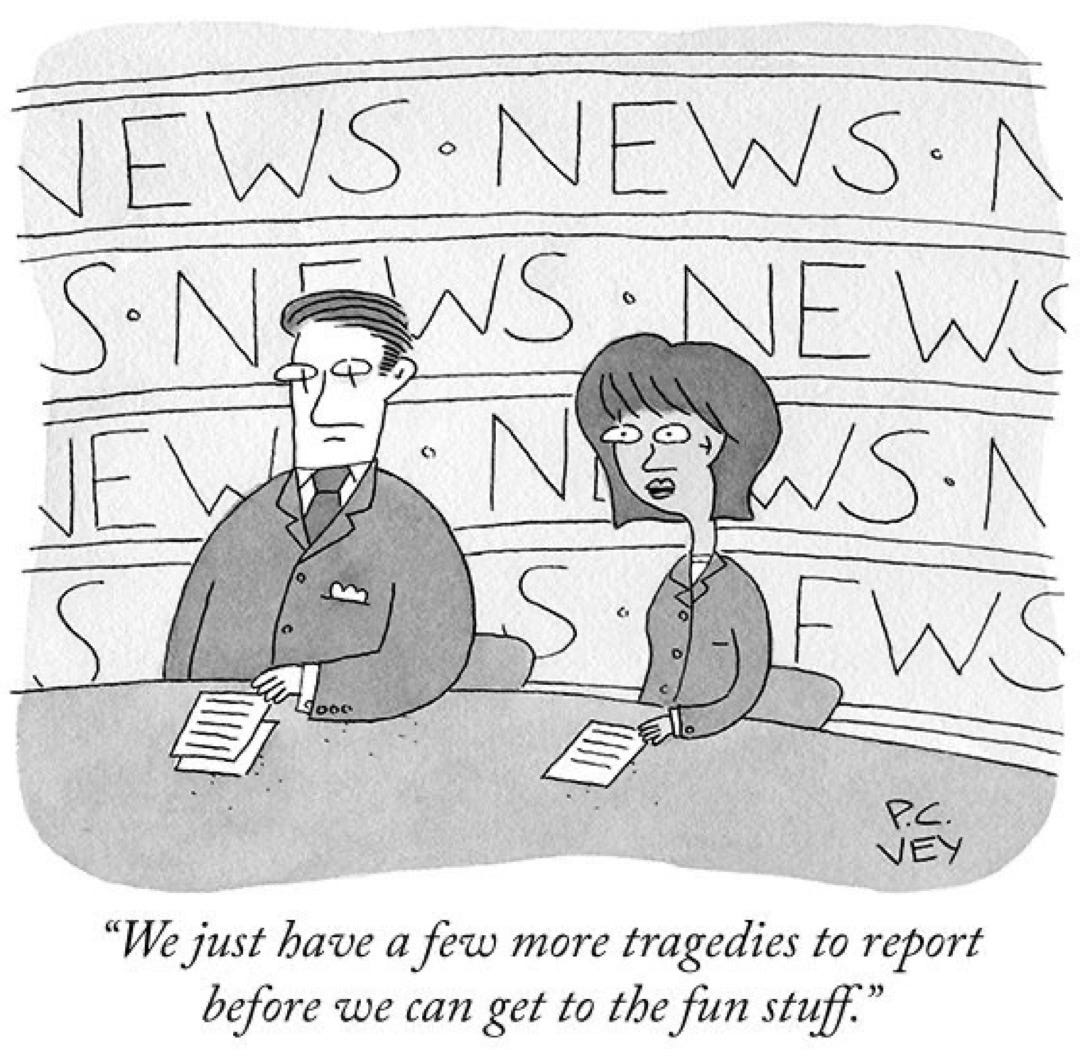The news these days is bleak. It's no wonder that people are tuning out. According to the annual Reuters Institute Digital News Report, many are increasingly choosing to ration news consumption and are selectively avoiding the nonstop barrage of negative news stories.
A variety of factors contribute to selective news avoidance:
Almost a third of people in the survey say the news negatively impacts their mood. This finding goes hand in hand with research showing that relentless gloom and doom reporting affects mental health. In addition to worsening feelings of anxiety, sadness, and helplessness, there is evidence that it can lead to PTSD-like symptoms. In some cases, excessive news consumption may even be worse than being physically present at a traumatic event. People who were glued to coverage of the Boston Marathon bombing were more likely to report acute stress than those who were actually at or near the site. An endless stream of bad news can leave us feeling emotionally shaken.
Concept Creep
Negative news stories have also been shown to exacerbate personal worries that are unrelated to the content of the story itself. A story about a disheartening political situation can amplify concerns about your relationship with your partner. An item about a tragedy across the world can magnify worries about your finances. Enhanced catastrophizing of personal worries follows the bad news bandwagon. While tempting, becoming an ostrich isn't the only option.
Here is what you can do to keep up without burning out:
1. Be Picky
Designate a time—either once or twice a day—to get your news fix from an established source. One of my favorite trusted sources is fellow Bulletin writer Jessica Yellin on Instagram and here on Substack. She gives you the news without all the noise.
2. Less is More
Constantly refreshing your feed and scrolling for more information may give the impression that you are in the know but research suggests the opposite. Keep in mind that following a breaking event may make you feel more involved but will not make you more informed.
3. Follow the Facts
Skip commentary and media that predict what might happen. Listening to pundits and so-called experts weigh in on the future is basically glorified gossip and of little value. Read or watch stories that intelligently present digested and reliable information about what happened. Ignore the rest.
4. Neutralize Negativity Bias
The brain is wired to pay attention to information that unsettles or scares us. It is no wonder that outrage porn, best-selling author Mark Manson's term for our addiction to negativity, hijacks our brains. The result is a doom-and-gloom view of the world. It's difficult to imagine anything else when all we hear about is horrific events and evil doers. As Manson writes:
The news doesn't show that the vast majority of people are good. They will help if they can. They care even if they're confused about how to care or why. The news doesn't teach you that most people won't hurt you and even if they do, you will recover and be fine and stronger than before.
For every bad or sad story, there are lots of uplifting ones that don't get any attention. Jessica Yellin's News That Doesn't Suck is a great way to keep things in perspective. I also love Axios' Finish Line.
5. Delight Hunting is the Antidote for Doom Scrolling
Be deliberate about generating positive emotions every single day and especially on bad news days. Researchers have found that the best way not to feel overwhelmed or paralyzed by the barrage of negativity is to counterbalance it with uplifts. Psychologist Jeff Larsen and his colleagues coined this the "coactivation model of mixed emotions." The basic idea is that we are better equipped to grapple with negative emotions like sadness if we experience them concurrently with positive emotions like joy. Positive emotions provide a psychological buffer, making it easier to deal with the onslaught of negative information and by providing a counterweight to helplessness and resignation.







